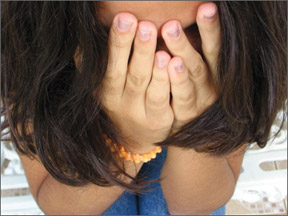|
Mark of shame :
Stigma of mental illness
Lionel Wijesiri
Mental illness is common in our country. According to a report one in
every four Sri Lankans will have a mental health problem at some point
in their lives. Mental illnesses account for a large percentage of
hospital stays every year. Yet, in spite of the fact that every Sri
Lankan adult knows someone who has been, or will be, affected by mental
illness, few people know very much about it.
 It
is human nature to fear what we don’t understand. That is why mental
illness is feared by many people. Unfortunately, it carries a stigma and
because of this stigma, many people hesitate to get help for a mental
health problem for fear of being looked down upon. It is unfortunate
that this happens because effective treatment exists for almost all
mental illnesses. Worse, the stigma experienced by people with a mental
illness can be more destructive than the illness itself. It
is human nature to fear what we don’t understand. That is why mental
illness is feared by many people. Unfortunately, it carries a stigma and
because of this stigma, many people hesitate to get help for a mental
health problem for fear of being looked down upon. It is unfortunate
that this happens because effective treatment exists for almost all
mental illnesses. Worse, the stigma experienced by people with a mental
illness can be more destructive than the illness itself.
Myths
There are many myths about mental illness. Here are some of them: (1)
People with mental illness are violent and dangerous. Wrong! Mentally
ill people are no more violent than any other group. In fact, they are
far more likely to be the victims of violence. (2) People with mental
illness are poor and/or less intelligent. Wrong! Most mentally ill
people have average or above-average intelligence. Like any physical
illness, mental disorder can affect anyone regardless of social class or
income level. (3) Mental illness is caused by a personal weakness.
Wrong! A mental illness is not a character flaw. It is an illness,
and it has nothing to do with being weak or lacking will-power. (4)
Mental illness is rare disorder. Wrong1 Mental illness is not a single
disease but a broad classification for many disorders. Anxiety,
depression, schizophrenia, personality disorders, eating disorders and
organic brain disorders can cause misery, tears and missed opportunities
for thousands of Sri Lankans.
One need not look far to find evidence of the stigma of mental
illness. A few years ago, at a sales staff get-together in my company, I
observed what happened when a bright young executive made the frank
disclosure that she suffered from bipolar disorder. Other colleagues,
who had previously been engaged and excited about learning about her
achievements, became extremely uncomfortable, refused to make eye
contact with her, and were quiet and withdrawn. I could not understand
what happened. All the executives around her were well-educated young
men and women, some even with MBAs. They were been groomed for the
future. Yet the stigma remained! It took us four months and three
full-day workshops (two attended by medical specialists) to put the
matters right.
Strategy
Persistent efforts to reduce the stigma associated with mental
illness haven’t succeeded as well as hoped, suggesting that new
strategies might be necessary. That enduring fear of mental illness is
precisely what we should work to combat. What we need is a systematic
plan which could well boost compassion for the mentally ill from the
grass roots upwards.
For decades, a number of state and voluntary organizations have been
trying to persuade the public that mental illnesses such as depression,
alcohol dependence and schizophrenia are neurobiological disorders, not
just people behaving badly, hoping that harsh judgments would subside.
So what might be the next strategy to reduce this pervasive stigma?
I believe part of the answer lies in stories, “having people with a
condition tell their story. This should include a “way-down story” and a
“way-up story”: “the way-down proving you are a person with a mental
illness and the way-up proving that you have recovered.”
Most people with serious mental illness do recover, so that’s why
way-up stories are so important. I suggest that these stories be told to
key power groups - instead of trying to change popular opinion, trying
to change important power groups like landlords and employers.
Stigma may be obvious and direct, such as someone making a negative
remark about another’s mental health condition or the treatment. Or it
can be subtle, such as someone assuming another could be violent or
dangerous because that person has a mental health condition. These and
other forms of stigma can lead to feelings of anger, frustration, shame
and low self-esteem - as well as discrimination at work, school and in
other areas of your life.
Negative Perception
For someone with a mental illness, the consequences of stigma can be
devastating. There are number of harmful effects of stigma. A person can
try to pretend nothing is wrong, refuse to seek treatment. The person
may be rejected by family and friends, discriminated at school or
work-place, be subjected to physical violence or harassment etc.
Independent studies show that the stigma of mental illness prevents
hundreds of Sri Lankans from seeking treatment. It was found that fewer
than half of those who reported mental illnesses during a year sought
treatment, and those who did waited at least half a decade, by which
time they were more likely to have developed additional problems.
Given the negative perceptions of mental illness, and the shame, it
is not surprising that people with mental disorders delay seeking help
for decades. Concealment remains a major means of coping.
Change
While there is a strong recognition that prejudice based on race,
ethnicity and gender is a social problem that we need to understand and
address, such recognition has not been given to prejudice - or its
consequences - based on mental illness. This is why, I believe, a
radical change of thinking is so important.
 |
|
Depressed
teenager. Google |
A far brighter future will emerge when knowledge replaces ignorance,
when effective treatments supplant custodial care and inadequate
community intervention, when legislation mandates equality and when
contact with the realities, rather than the stereotypes of mental
disorder, taps people’s empathy.
Much needs to be done to compel people to break the stigma of mental
illness.
The grass level community organisations should work closely with the
Government to help end the stigma of mental illness through greater
public awareness and outreach as well as the recognition of the
importance of funding to the mental health community.
It is amazing how many people who have a mental illness or have it in
their family sit in lonely silence until they hear someone like us tell
our story. It may only be privately to us that they reveal the existence
of mental illness in their life, but it is a start in their releasing
this burden and a significant step in their healing process.
The most powerful antidote for the internal effects of stigma and
discrimination is spiritual strength. However, the spiritual strength
will diminish, however, unless it is constantly nurtured through giving
and receiving loving care in our relationships with others. Thus it is
of major importance that each of us should attempt to develop a welcome
and spiritually nourishing environment for those affected by mental
illness.
We know that these are difficult times and tough choices have to be
made. But when the mental health system is overburdened and the number
of people entering the system is burgeoning, it is important to keep the
vital community safety net in place. Stigma produces silence. Silence
allows stigma to go on unabated. We do need more than talk to stop
stigma, but it would be a huge step toward its elimination if the voices
of those affected by mental illness could be heard.
We have already changed the way we refer to women and people with
physical disabilities. Why stop there?
|



